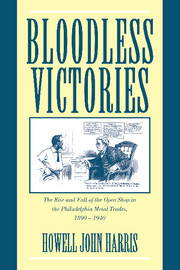Book contents
- Frontmatter
- Contents
- Figures and Tables
- Acknowledgments
- Abbreviations
- 1 Introduction
- 2 The Iron Masters
- 3 Laying the Foundations: Peace and War in the Metal Trades, c. 1890–1904
- 4 Combat, Crisis, and Consolidation, 1904–1915
- 5 “The Largest, Strongest, and Most Valuable Association of Metal Manufacturers in Any City”
- 6 Riding the Storm, 1915–1918
- 7 The War After the War, 1918–1923
- 8 Pacific Passage: Quaker Employers and Welfare Capitalism, c. 1905–1924
- 9 A Liberal Interlude: The Modernization of the MMA, c. 1924–1931
- 10 The Deluge: The Great Depression and the End of the Open Shop
- 11 The New World: Accommodation and Adjustment, 1936–1939
- 12 Afterword: “We'll Still Be There. We're Not Going Away”
- Appendix: Databases Referred to in Text: Nature, Sources, Use
- Index
2 - The Iron Masters
Published online by Cambridge University Press: 21 September 2009
- Frontmatter
- Contents
- Figures and Tables
- Acknowledgments
- Abbreviations
- 1 Introduction
- 2 The Iron Masters
- 3 Laying the Foundations: Peace and War in the Metal Trades, c. 1890–1904
- 4 Combat, Crisis, and Consolidation, 1904–1915
- 5 “The Largest, Strongest, and Most Valuable Association of Metal Manufacturers in Any City”
- 6 Riding the Storm, 1915–1918
- 7 The War After the War, 1918–1923
- 8 Pacific Passage: Quaker Employers and Welfare Capitalism, c. 1905–1924
- 9 A Liberal Interlude: The Modernization of the MMA, c. 1924–1931
- 10 The Deluge: The Great Depression and the End of the Open Shop
- 11 The New World: Accommodation and Adjustment, 1936–1939
- 12 Afterword: “We'll Still Be There. We're Not Going Away”
- Appendix: Databases Referred to in Text: Nature, Sources, Use
- Index
Summary
The first aim of this chapter is to describe the structure of the metal-manufacturing community of the great and grimy industrial city of Philadelphia at the dawn of the twentieth century. Examining some of the men and the companies that composed it, we will then explore the proprietary capitalist nature of business enterprise in Philadelphia metal working, and go on to investigate their owners' managerial philosophies. We will discover that most of them favored tradition, simplicity, and direct, personal control just as much as they believed in the absolute rights of ownership. This bundle of values would have significant implications for the type of labor relations strategy that they decided to pursue. When unionized skilled workers attempted to assert a claim to share in decision making about wages, hours, and working conditions in firms such as these, they would be seen as trespassers in other men's houses, in many cases houses that their proprietor-managers had built at their own risk and with their own sweat. This fact, and the threat that craft unions posed to enterprises' viability as well as enterprisers' freedom, would help sustain the Open Shop creed for a long generation.
THE WORLD'S GREATEST WORKSHOP
Philadelphia was America's first big city, its oldest manufacturing rather than commercial metropolis, and in 1900 only New York and Chicago – which had surpassed it in the 1880s – outranked it in population and output. These three cities were in a different league from other American industrial centers – the value of the goods that Philadelphia produced exceeded that of forty-five states and territories.
- Type
- Chapter
- Information
- Bloodless VictoriesThe Rise and Fall of the Open Shop in the Philadelphia Metal Trades, 1890–1940, pp. 29 - 73Publisher: Cambridge University PressPrint publication year: 2000



